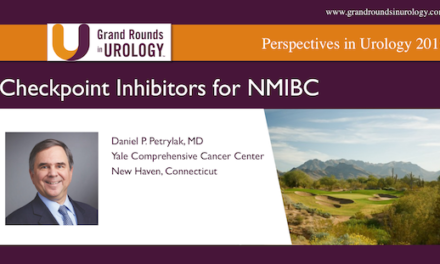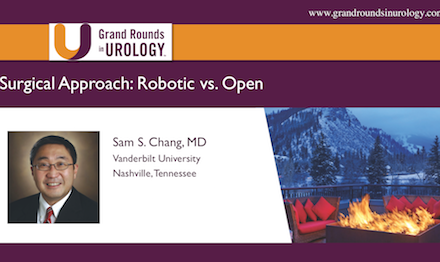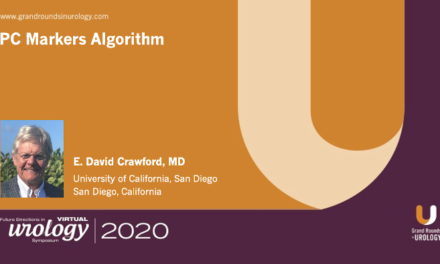Donna E. Hansel, MD, PhD, presented “Biomarker Integration for Advanced Urothelial Carcinoma” at the 6th International Bladder Cancer Update on November 20, 2022, in Scottsdale, Arizona.
How to cite: Hansel, Donna E. “Biomarker Integration for Advanced Urothelial Carcinoma” November 2022. Accessed Dec 2022. https://grandroundsinurology.com/biomarker-integration-for-advanced-urothelial-carcinoma/
Biomarker Integration for Advanced Urothelial Carcinoma
Donna E. Hansel, MD, PhD, delves into the critical role of biomarker integration in the management of advanced urothelial carcinoma and underscores the transformative potential of biomarkers in enhancing diagnostic precision, guiding treatment decisions, and improving patient outcomes.
Dr. Hansel defines biomarkers and their significance in oncology, particularly in the context of urothelial carcinoma. Biological molecules found in blood, other body fluids, or tissues indicate a normal or abnormal process, condition, or disease. In advanced urothelial carcinoma, biomarkers can offer insights into the tumor’s genetic and molecular landscape, helping clinicians tailor treatments to each patient’s cancer.
Several key biomarkers have shown promise in urothelial carcinoma, including genetic alterations such as FGFR3 mutations, ERBB2 amplifications, and DNA damage repair gene mutations. Dr. Hansel discusses how these biomarkers can predict responses to targeted therapies and immune checkpoint inhibitors, offering a personalized approach to treatment. For example, patients with FGFR3 mutations may benefit from FGFR inhibitors, while those with high mutational burden might respond better to immune checkpoint blockade.
Dr. Hansel also delves into the methodologies used to detect these biomarkers, including next-generation sequencing (NGS), immunohistochemistry (IHC), and liquid biopsies. She emphasizes the importance of integrating these advanced diagnostic tools into clinical practice to ensure accurate and comprehensive biomarker profiling. The use of liquid biopsies, for instance, allows for non-invasive monitoring of tumor dynamics and treatment response, offering a significant advantage over traditional tissue biopsies.
Dr. Hansel acknowledges the limitations of biomarker integration, such as the variability in biomarker expression, the need for standardized testing protocols, and the economic considerations of widespread biomarker testing. Despite these challenges, she advocates for continued research and collaboration to overcome these barriers and maximize the clinical utility of biomarkers.
About the 6th International Bladder Cancer Update:
The International Bladder Cancer Update (IBCU) is a CME conference focused on the diagnosis and treatment of bladder cancer. The conference offers medical professionals an opportunity to listen to updates from, and interact with, expert international faculty to improve knowledge and determine best treatment practices to improve patient outcomes. IBCU encompasses expert lectures, interactive discussions, a panel roundtable, debates, and case presentations. It is physician-led, multi-supported, and designed for urologists, urologic oncologists, and other healthcare professionals involved in the treatment of bladder cancer.
For further educational activities from this conference, visit our collection page.
ABOUT THE AUTHOR
Donna E. Hansel, MD, PhD, is the Division Head of Pathology and Laboratory Medicine at the University of Texas MD Anderson Cancer Center in Houston, Texas. Previously, Dr. Hansel served as the Chair of Pathology at Oregon Health & Science University (OHSU) in Portland, Oregon. In 2013, Dr. Hansel was appointed Professor of Pathology and Chief of the Division of Anatomic Pathology at the University of California, San Diego. Dr. Hansel joined the Cleveland Clinic Anatomic Pathology Staff as Assistant Professor in 2006 as a subspecialty genitourinary pathologist and was promoted to Associate Professor in 2010.
Dr. Hansel completed a bachelor of science degree in biology at Johns Hopkins University, graduating Phi Beta Kappa. She subsequently completed the MD-PhD Medical Scientist Training Program, pathology residency, and urologic pathology fellowship at the Johns Hopkins University School of Medicine.
Dr. Hansel has authored over 170 peer-reviewed publications, edited or authored five textbooks on urologic pathology and biospecimen repositories, and participated in more than 100 national or international talks on bladder cancer. She has participated in the kidney-urinary tract panel for the 8th Edition Cancer Staging Manual of the American Joint Committee on Cancer (AJCC) and contributed to the 5th edition of the WHO Classification of Tumours of the Urinary System and Male Genital Organs. In addition, Dr. Hansel is on the editorial board of the American Journal of Surgical Pathology, Advances in Anatomic Pathology, American Journal of Pathology, Histopathology, and Archives of Pathology & Laboratory Medicine where she serves as Deputy Executive Editor. Dr. Hansel has mentored over 40 residents, graduate students, and postdoctoral fellows while remaining active in clinical science and overseeing a research laboratory focused on invasive cancer mechanisms.




